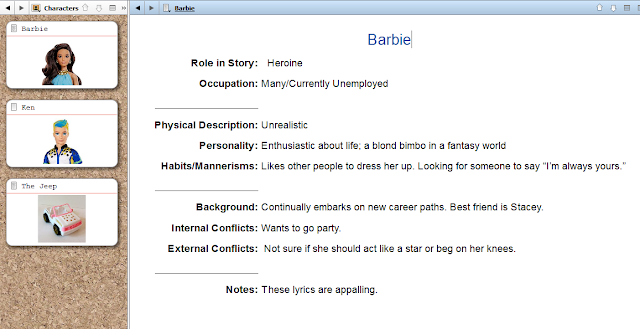Scrivener's Magic Plotting Powers: How Not To Write Like George R.R. Martin
The best way to
understand chaos is to dump a bucket of LEGOs out on your kitchen
table.
This is a super
efficient method of getting all the little translucent fire pieces
out so you can build a volcanic fortress for your Catwoman LEGO. It’s
also a really great way to never be able to use your kitchen table
again. The obvious problem here is that it’s a total pain in the
ass to get all the LEGOs back into the bucket. Oh, you think you’re
clever, and you can slide them off the table into a strategically
placed bucket below? Sweet, summer child: no human alive has ever
done this with 100% success. You’re absolutely going to get pieces
on the floor, and I will tell you right now that you’re going to
want to get down on your hands and knees to get every last piece,
because otherwise Future You is going to find out that those sharp
little pieces will fuck your day up.
 |
| (Totally worth it though.) |
Creating characters and storylines exactly like a bucket of LEGOs. It’s super easy to create a new character or a dramatic cliffhanger, she wrote, as a familiar silhouette suddenly appeared in her doorway…
See?
You were hooked! Well, that silhouette was just my cat, and he has a
problem with closed doors so I just always leave them open.
But what I just did there was introduce a new character with the ability to impact the storyline in new ways. It’s exciting, because just like when you first dump that bucket of LEGOs, there’s so much untapped potential. Conversely, characters I’ve already written about are complex; stuff has already happened to them, and they’re already on a plot path I can’t change without somehow explaining it to my readers. Following the same metaphor, a new pile of LEGOs is unblemished by all the half-assed spaceships I’ve already constructed. It is pure; magical. So if I write myself into a corner and don’t know how to get my character out of it: enter stage left, New Guy! New Guy has miraculously shown up and either rescued our hero from certain doom or certain boredom.
 |
| (Soon, human...) |
But what I just did there was introduce a new character with the ability to impact the storyline in new ways. It’s exciting, because just like when you first dump that bucket of LEGOs, there’s so much untapped potential. Conversely, characters I’ve already written about are complex; stuff has already happened to them, and they’re already on a plot path I can’t change without somehow explaining it to my readers. Following the same metaphor, a new pile of LEGOs is unblemished by all the half-assed spaceships I’ve already constructed. It is pure; magical. So if I write myself into a corner and don’t know how to get my character out of it: enter stage left, New Guy! New Guy has miraculously shown up and either rescued our hero from certain doom or certain boredom.
This strategy works the first time. And maybe even the second time! But imagine
if I was writing a book and every time I got bored with a scene, I
just spiced things up with something new. Although readers love new and mysterious things, the whole reason we start
reading a book — and then keep reading — is because we want to
find out what happens to characters we met in the beginning. That’s why we stay up all
night finishing a book, or binge-watching an entire season of
Stranger Things. Our protagonist’s fate is in question, and
goddammit, we the people want answers!
Writers can totally take advantage of your emotions like that. There’s no better feeling for a writer when your audience is begging you for more at the end of a chapter (or book; or TV season; or movie... you get the idea). You've just left the stage after a full set and still haven't played "We are the Champions" or "We Will Rock You" (incidentally, Queen played these two encore songs at Wembley Stadium in 1986 -- and it's considered one of the best encores in all of Rock n' Roll history).
In a way, writers are all that angsty teenager who just posted on Facebook, “did everything I culd but still got dis dagger in my back,” and then they’re sitting there anxiously waiting for people to comment, “wut happened???”
Writers can totally take advantage of your emotions like that. There’s no better feeling for a writer when your audience is begging you for more at the end of a chapter (or book; or TV season; or movie... you get the idea). You've just left the stage after a full set and still haven't played "We are the Champions" or "We Will Rock You" (incidentally, Queen played these two encore songs at Wembley Stadium in 1986 -- and it's considered one of the best encores in all of Rock n' Roll history).
In a way, writers are all that angsty teenager who just posted on Facebook, “did everything I culd but still got dis dagger in my back,” and then they’re sitting there anxiously waiting for people to comment, “wut happened???”
That
angsty teenager is George R.R. Martin, author of the bestselling Song
of Ice and Fire series and only
millionaire alive who wears a train conductor hat without a trace of
irony. All his fans are sitting around for the better part of a
decade like, “Wut happened, Jon Snow??? Are u really dead?” And
GRRM is like, “Fuck if I know… I just got bored and couldn’t
figure out how else to make some cool shit happen.”
 |
| (Winter is never coming.) |
Writing based entirely on whimsy is a really mean thing to do to your readers. It’s lazy writing. It’s five seasons of Lost, or waking up on Dallas to find out it was all a dream. If you raise the stakes, you’d better not be bluffing, because your readers will totally call you on it. If you’re writing a seven-book series, you shouldn’t be introducing new characters and plotlines in book five — you should be figuring out how to resolve all the LEGOs you dumped in books one through four. But that’s something GRRM’s editor should be telling him, not me. At this point, his editor’s only job is just to call him every day and say, “Please. We’ll take anything. Ten pages. Five. Something you wrote in sidewalk chalk on your driveway. We don’t even care if these chapters have any of the original characters in them or have anything to do whatsoever with the plot or if it’s just your grocery list from last week — we’ll take it!”
 |
| (A top-secret exclusive preview of Winds of Winter.) |
All the writing blogs I’ve been reading lately seem to categorize writers into two types: pantsters and plotters. (Pantsters: writing by the seat of your pants; Plotters: planning shit out ahead of time like a professional.) I also gathered that, somehow, pantsters comprise about 50% of the writing world and are totally accepted in the writing community. They are not exiled and burned at the stake like monsters. So I guess it’s possible that some pantsters are half-decent at making everything up as they go.
I've decided to be a
plotter, though; I’d already learned — the hard way — that being a
pantster sucks.
When I’d first
started writing this romance three years ago (working title: “dragon
romance_1”), totally amateur Past Jennifer sat down and just began
with Chapter One. It was super great: the story begins with a
dramatic introduction to an evil patroness (who I hadn’t named or
come up with a backstory for), as she hires our heroine, Charlotte (a
half-fae mercenary of dubious origin), to slay a dragon for her in
exchange for some black diamonds. I hint at all kind of cool
possibilities: maybe Charlotte needs these mystical black diamonds to
power her magical abilities and she’ll die without them! Maybe the
dragon isn’t a dragon after all, but a super hot
shapeshifter/dragon/sorcerer dude!
Well, we don’t really find out, because I then proceeded to write TEN more chapters introducing a very complex supporting cast, all of whom have mysterious back stories and impact the plot in some way I hadn’t figured out yet. Prolific Past Jennifer had busted out 50,000+ words in three weeks, but she'd put zero time into writing notes or organizing the plot. After all, this important information was locked securely in my brain!
 |
| ("This is going to be the best... book... EVER!!!") |
Well, we don’t really find out, because I then proceeded to write TEN more chapters introducing a very complex supporting cast, all of whom have mysterious back stories and impact the plot in some way I hadn’t figured out yet. Prolific Past Jennifer had busted out 50,000+ words in three weeks, but she'd put zero time into writing notes or organizing the plot. After all, this important information was locked securely in my brain!
 |
| (Locked up tight.) |
Fast forward three
years as I open up the .doc file I’d emailed myself. I began
reading through this hot mess with increasing dismay.
Don’t get me wrong: as a reader, I was hooked. Wow, all these vague references to dark pasts and a possibly complex magic system! Even better: a mysterious hero we haven’t met yet! Can’t wait to find out what happens! Unfortunately, Writer Jennifer ALSO couldn’t wait to find out what happens — I had zero clue what my plan had been three years ago. Even worse: I’m pretty sure even Past Jennifer also didn’t know what the plan was. Past Jennifer was a bad, bad pantster, and she should have been exiled and burned at the stake.
Don’t get me wrong: as a reader, I was hooked. Wow, all these vague references to dark pasts and a possibly complex magic system! Even better: a mysterious hero we haven’t met yet! Can’t wait to find out what happens! Unfortunately, Writer Jennifer ALSO couldn’t wait to find out what happens — I had zero clue what my plan had been three years ago. Even worse: I’m pretty sure even Past Jennifer also didn’t know what the plan was. Past Jennifer was a bad, bad pantster, and she should have been exiled and burned at the stake.
That junk was
written in MS Word. You can’t keep your shit organized in a
straight word processing program like a good little plotter. Word
documents flow like the passage of time: point A to point Z. Word is
the perfect catnip for panststers; just start writing at point A, and
keep going until you get to the end. Don’t look back. Not sure what
to do with a tertiary character you created 70 pages ago? Kill ‘em
off, or put them in a rowboat at Dragonstone so you never have to see
them again.
 |
| (Bye, Felicia.) |
With Scrivener,
you can keep all your supporting documents, character profiles, and
background info accessible.
 |
| (First draft: plotting out each scene) |
You can also flip back and forth easily
between your manuscript and all your character info, and it’s much
harder to forget about a character or plotline when they’re all a
click away on the sidebar. You can also drag and drop chapters like
puzzle pieces.
 |
| (Everything you need to know about your characters, all in one place.) |
Once
I paid for Scrivener ($40 — it’s worth it), I had to force myself
to be a good girl and actually use it. That hot mess I’d written
three years ago? I transferred it piece by piece, so every character
and scene got it’s own page. I sat my ass down and wrote out a full
outline. I figured out the logistics of my world’s magic system. I
wrote a 1,500 word timeline of everything that had happened in the
last 500 years leading up to the day my hero and heroine met. And
then I wrote even more detailed backgrounds for each character,
including their personal motivations and goals, their hobbies, their
little quirks, personal flaws… all of this took me two
whole weeks. That’s a lot of
time when you’re unemployed and making zero moneys. One could argue
it might even be overkill; it’s just a romance novel, not some
fantasy epic.
The thing is: I
wanted this magical world I’d created to have a solid foundation.
That way I can write follow-up books in the same world without
having the whole LEGO tower fall apart. You know, if I actually
finish and sell this first one. See how responsible I am? I’m
acting like this is a real career and not just a whimsy to keep
myself busy as an excuse to not look for a “real” job again!
I feel guilty
about writing this entire post on the shoulders of my personal resentment
about George R.R. Martin, so I want to
highlight how fucking great he is at making up character and place
names. He’s probably the best I can think of in the fantasy world.
All the names and places he picks are appropriate while still being
original, and they don’t just sound like he mashed a bunch of
letters together until they made a name (which is how my group seems to do it in our Dungeons & Dragons campaigns). Winterfell? Valyria? King’s
Landing? Daenerys? Arya? These are all great names. Arya was one of
the most popular baby girl names last year. So was Khaleesi, though, which is
embarrassing for that child because Khaleesi isn’t a real name.
Congratulations, you’ve just named your child “Queen” in
Dothraki, a tribe of rapey horse-people loosely based on Genghis
Khan’s squad.
 |
| (....) |
In my next post,
I’ll talk about how terrible I am with coming up with names, and
other deep thoughts about how romance novelists create interesting characters.
** In the comments: If you know any pantsters who are actually really good authors, whose books actually meet expectations by the final page, please share! I feel like the true hallmark of a good author is how the last 1/3 of the book lives up to the promises and quality standards set up in the first few chapters. Endings are hard, and they're even harder if you're making it all up as you go. Are any non-plotting authors good at it? (I don't know!)


Comments
Post a Comment